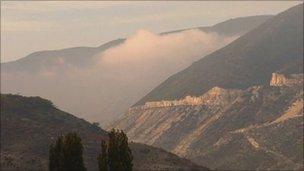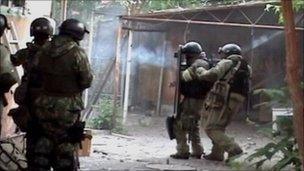Dagestan's deadly Islamic insurgency
- Published
The Islamic insurgency in Dagestan
Magomed has one of the most dangerous jobs in Russia. He is a policeman - in Dagestan.
"Police here are constant targets," he tells me as we drive through the capital, Makhachkala.
"Whenever I get out of the police car, I always wonder if the insurgents will see my uniform and will shoot me. Six of my colleagues have been killed this year. At night you won't find any policemen on the streets - we're all too frightened."
From the car window, Makhachkala looks like a normal, bustling city.
The roads are full of traffic, the streets bristling with pedestrians hurrying home from work. With its stunning backdrop of the Caucasus mountains on one side, and the Caspian Sea on the other, the place almost feels like the Russian Riviera. But an Islamic insurgency has turned a potential resort into a war zone.
Nearly every day, the rebels attack police and local officials. In one shooting spree last week, seven Dagestani policemen were killed. On Monday, a gunman burst into a hospital and murdered a traffic policeman who had been recovering in bed.
The Russian security forces respond by carrying out "special operations" in towns and villages across Dagestan. Acting on intelligence, they seal off streets, whole neighbourhoods, and open fire to root out rebel fighters.
But who are the insurgents? And what are they fighting for?
'Foreign training'
"The aim of the extremists is to tear the Caucasus away from Russia," Dagestan's President, Magomedsalam Magomedov, tells me.
"Many of them are mercenaries who've undergone instruction in Taliban training camps in Afghanistan and Pakistan.
"They have links to al-Qaeda and to other terrorist groups across the Caucasus which share the same goal.
"They want to turn the whole region into an Islamic state based on sharia [Islamic] law but we will defeat them."
Moscow sees this is as a battle it cannot afford to lose - not only if it is to retain control of the North Caucasus, but also provide security for the whole country.
In recent years, different parts of Russia have suffered acts of terror carried out by extremists from the Caucasus. Police say it was female suicide bombers from Dagestan who attacked the Moscow Metro earlier this year killing 40 people.
I head into the mountains and drive to Gubden - a village viewed by the authorities as a hotbed of Islamic fundamentalism.
A Gubden rebel commander was suspected of having organised the Moscow Metro attacks and there have been "special operations" in and around the village.
The atmosphere is tense. One entrance to the village is blocked off and there is a checkpoint with troops.
When I finally get in, the streets are busy. There are children driving mopeds down narrow twisting lanes and women in headscarves gathering water from a well.
The entire village and its small white houses seem to grow out of the rock of the Caucasus mountains themselves.
'Abducted and tortured'

The atmosphere in Gubden is tense
In his garden in Gubden, Magomed Saidgadzhiev keeps sheep and chickens. There are fruit trees too.
As we stroll across the grass, Magomed, 77, tells me about his son Saidgadzhi, killed by the security forces.
The police had told Magomed his son had been caught taking supplies to the insurgents and that he had been shot in a gun battle.
But Magomed claims his son was abducted and tortured to death. To prove their case, his family later show me photographs of the corpse taken in the morgue
"There was only one bullet hole in his whole body," Magomed tells me.
"The rest of his wounds were made by a knife. A dagger. He'd been sliced up like you'd cut up a pig. What the authorities want all of us to do here is turn our backs on fundamentalist Islam. Then they'll leave us in peace. But I will never turn my back on my faith."
Human rights campaigners in Dagestan warn that brutality by the police and the security forces is pushing some Muslims to take up arms against the state.
Followers of Salafi Islam, the kind of strict Islam promoted by Saudi Arabia, regularly complain of police harassment and persecution. The authorities concede that force alone will not secure peace.
The chronic economic and social problems of the region - high unemployment and rampant corruption - feed extremism. Radical ideas thrive in such a soil.
'There will be war'
Even the police admit the situation is out of control.

Clashes between security forces and militants are frequent in Dagestan
When I sit down with policeman Magomed and two other officers to talk about Dagestan, together they paint a bleak picture. They tell me about the sons of police chiefs who had become insurgents. One had driven a rebel commander round in his father's police car for a year. Another had ordered his own father's murder.
In this atmosphere of increasing brutality, the lines between religious extremists, mafia gangs and corrupt officials are blurred. One of the officers told me that on one occasion local police had pretended to be Islamic fighters so they could extort money from local businessmen.
At the end of our meeting, Magomed drives me back to my hotel. I ask the policeman what he thinks will happen in Dagestan.
"There will be war here, war!" he tells me.
"Don't expect anything else. It'll be the same as it was in Chechnya. No. It will be even worse. The war in Chechnya was simpler - it was a conflict between Russians and Chechens.
"Dagestan is such a multi-ethnic republic. When it all explodes here, you won't be able to restore peace between all the different peoples of Dagestan. Nobody will know who's fighting who. Not here. It will be a nightmare."